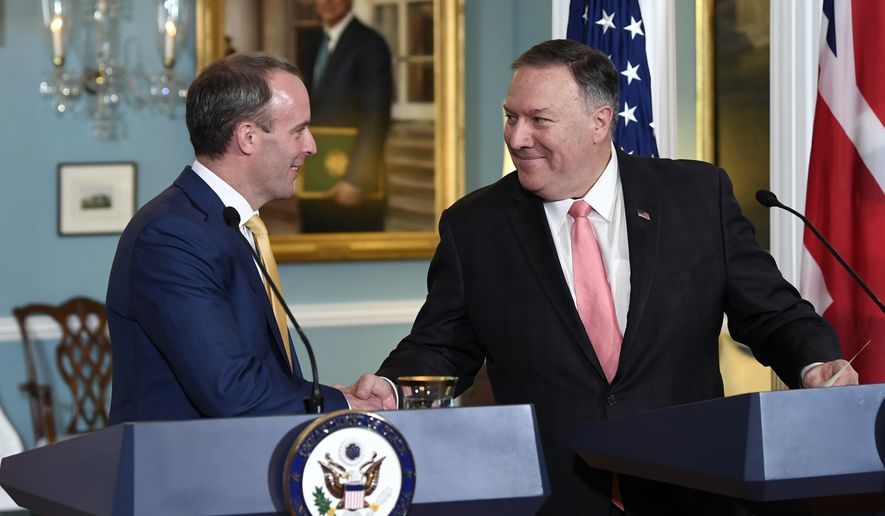The government of new British Prime Minister Boris Johnson, at loggerheads with its soon-to-be-former European partners as Brexit looms, is finding a friend in need in the Trump administration.
A day after an unscheduled personal meeting with President Trump, visiting British Foreign Secretary Dominic Raab got a clear sign that the U.S. is ready to cut a free trade deal once London is free of the European Union.
Briefing reporters alongside Mr. Raab on Wednesday, Secretary of State Mike Pompeo said the Trump administration will be waiting “pen in hand” to sign a trade deal with the United Kingdom once Brexit is completed, now set for no later than Oct. 31.
“We support the United Kingdom’s sovereign choice however Brexit ultimately shakes out,” Mr. Pompeo said during a press conference with Mr. Raab.
Mr. Trump, a supporter of Brexit who has repeatedly praised Mr. Johnson, has dangled a free trade deal with the United Kingdom as its Parliament struggles to fashion an acceptable Brexit deal with the EU. Forty-five Republican senators signed a letter to Mr. Johnson expressing their willingness to back a bilateral trade deal.
Brexit backers have also repeatedly argued that London would have far greater freedom to negotiate its own trade pacts once it leaves the 28-nation European bloc. Liz Truss, British secretary of state for international trade, plans to address the conservative Heritage Foundation on the need to strike a quick U.S.-U.K. trade deal, and Mr. Raab’s North American tour includes stops in Canada and Mexico as well.
But skeptics say Brexiteers are overestimating London’s clout and freedom to maneuver on its own. Larry Summers, Treasury secretary under President Obama, told the BBC this week that the Johnson government could be in for a rude awakening in trade talks with the U.S.
“Britain has much less to give than Europe as a whole did, therefore less reason for the United States to make concessions,” Mr. Summers told the British news service. “You make more concessions dealing with a wealthy man than you do dealing with a poor man.”
Mr. Raab noted that Mr. Summers was a member of the previous, anti-Brexit U.S. administration and told Fox News that “trade negotiations always involve compromise” and are always “tough and gritty.”
Complicating matters is the uncertainty over whether Mr. Johnson will be able to negotiate a modified, orderly divorce agreement with the EU or crash out of the bloc with a “no-deal Brexit,” which holds huge uncertainties for British business and economic policy. Despite gaining a head start on a trade agreement, a deal cannot be negotiated before Brexit is complete because the EU has control over trade and negotiations for its members.
Mr. Pompeo gave the clearest signal to date that the Trump administration is eager to make a deal.
“The U.S. will be at [Britain’s] doorstep, pen in hand, ready to sign onto a new free trade agreement at the earliest possible time,” Mr. Pompeo told reporters Wednesday.
Determined to leave
During the press conference, Mr. Raab expressed confidence that the U.K. will formally leave the EU, with or without a deal, by the end of October.
“We will stay good friends, good neighbors, with our European partners, but we are at the same time determined to seize the global opportunities beyond Europe,” Mr. Raab said.
Mr. Johnson has said his government is bracing the country for the possibility of a no-deal Brexit amid dire warnings of backlogged customs and border checks, new tariffs on trade with Europe and the loss of clout that comes with being part of a 28-nation bloc.
Britain is the second-largest economy in the EU after Germany, and the EU as a whole is Britain’s No. 1 trading partner. But in country-by-country comparisons, the U.S. is Britain’s biggest single overseas market.
According to the U.S. Census Bureau, Britain has been one of the top 10 trading partners for the past decade and nearly 43,000 companies export to the U.K. In the first five months of this year, two-way trade between the nations amounted to $54.9 billion.
Mr. Raab made the rounds in Washington this week and spoke briefly with Mr. Trump on the sidelines of scheduled meetings with Vice President Mike Pence and National Security Adviser John R. Bolton.
Mr. Raab’s visit marked a notably more positive tone after the transition from former Prime Minister Theresa May, who faced regular criticism from Mr. Trump over her handling of Brexit.
“We in the U.K. really prize [the U.S.-U.K.] relationship, we value it enormously and we really appreciate, both from the administration but also the personal mark you and the president made, the friendship that we have,” Mr. Raab said in his opening remarks, “and we look forward to nurturing in the weeks, months and years ahead.”
The meeting was held just days after Britain announced that the Royal Navy will participate in the Pentagon’s proposed joint mission to protect vessels traveling through the Persian Gulf amid soaring tensions with Iran.
Tehran said Sunday that it had intercepted a third ship traveling in the Gulf, just weeks after Iranian forces seized a British tanker traveling through the Strait of Hormuz, a key shipping channel in the Gulf.
“I want to thank Britain for your decision to protect the freedom of navigation in the Strait of Hormuz,” Mr. Pompeo said Wednesday. “This is a victory for meaningful, effective multilateralism.”
European allies, many of whom blame Washington in part for the tensions by abandoning the 2015 nuclear agreement with Tehran, have been reluctant to sign onto the U.S. proposal for joint operations to protect shipping in the heavily trafficked waterway.
Mr. Raab said that while the Johnson government continues to support the 2015 Iran nuclear deal that Mr. Trump repudiated last year, “it’s absolutely imperative to uphold freedom of navigation in the Strait of Hormuz.”
• Lauren Toms can be reached at lmeier@washingtontimes.com.




Please read our comment policy before commenting.